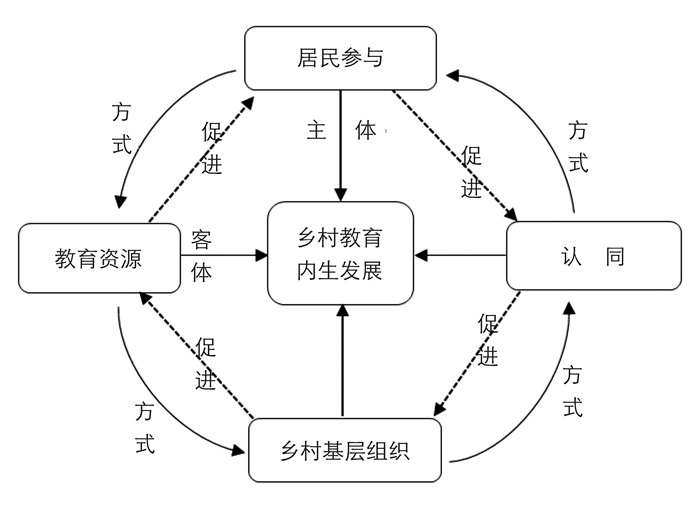-
乡村教育发展是一项系统性、基础性工程,乡村兴,乡村教育必先兴。党的十八大以来,党和政府高度重视乡村教育发展,先后出台了一系列发展乡村教育的政策举措,诸如农村薄弱学校改造计划、乡村教师支持计划、师范生公费教育政策等,着力解决乡村教育发展中存在的突出问题,并取得显著成效。然而,政府在加大乡村教育投入,推动城乡教育一体化时,乡村教育发展的深层次问题,即如何建构富有乡村特色的、合宜乡村教育发展的乡村教育模式却被遮蔽。正如有学人所言,“我们关注乡村教育,在尽可能给予乡村少年同等升学机会和提供更多教育资源配置的同时,也让他们特别是那些上不了大学的乡村孩子更多地受到对于他们而言(最)好的教育”[1]。显然,乡村教育发展亟须由外在性发展向内生性发展转型,重构一种基于乡村的教育发展模式。毛泽东曾在《矛盾论》中指出:事物发展的根本原因,不是在事物的外部而是在事物的内部,在于事物内部的矛盾性[2]。乡村教育发展除了寻求外力支持,更需要实现其内生性发展。因此,基于“在乡村”的教育现实,立足乡村教育发展需求,探寻乡村教育发展的内生机制,对于乡村教育质量的提升具有重要现实意义。
全文HTML
-
唯物辩证法认为,一切事物都是不断发展的,发展既有内部原因也有外部原因,但内因是主要的、第一位的,而外因则是第二位的。所以,在乡村教育发展中,如果只强调外部力量的帮扶,而不注重乡村教育的自身发展,外部力量无法被内化,使之转化为内因,那么,外部帮扶力度一旦减弱或缺失,乡村教育的发展又将返回原有状态。乡村教育必须注重自身发展,不断增强自身生长力,走内生发展之路。
-
内生发展(endogenous development)是20世纪末在西方社会学研究领域常用的一个术语,最初提出者是日本社会学学者鹤见和子。1969年,鹤见氏针对地域发展方式初始状态的不同,将其分为“外发的发展”和“内发的发展(土生土长的发展)”两种模式[3]。其中,前者是以政府投入和吸收外来资金为主,推进经济快速增长;后者是在立足区域生态、文化的同时,关注“区域内民众的参与和创造”,从而建立良好的社区秩序。
1975年,瑞典达格·哈马舒尔德财团在第七届联合国特别大会上提交的《另一个发展》提出了有别于外生式发展模式的“另一种模式”,即“内生发展”这一概念,认为如果发展作为个人解放和人类的全面发展来理解,那么事实上这个发展只能从一个社会的内部来推动[4]。至此,“内生发展”这一概念被正式提出。随后,弗朗索瓦·佩鲁指出,内生发展是一个国家或地区合理开发与利用本地资源、提升内部能力的发展[5]。之后,学者们对内生发展的关注主要从理论与实践两个方面展开,一方面是基于地区需要和内生潜力使用的自主性参与式发展[6];另一方面也被理解为主要由当地推动,且以当地资源为基础的地方发展[7]。内生发展提高了人们对当地(本土)的认识,增进了相互了解,促进了地方认同,有利于激励人们留在当地并参与当地发展。
在上述研究的基础上,笔者认为内生发展的内涵一般包括以下几方面:一是在发展理念上,合理开发与利用区域资源,不断增强区域内部的生长能力,在必要时积极争取外部支持,但并不依赖于此;二是在发展动力上,充分挖掘区域内部的“内生基因”,如当地的文化古迹、历史民俗、特色产品、传统技能、山水风光和相关的传说故事等,唤醒当地人的发展自信,增强当地人对区域发展的认同;三是在参与发展对象上,充分尊重当地居民的意愿,以当地人为区域发展的主体,激发当地人对区域发展的促进作用和象征意义;四是在发展保障上,要建立一个能够体现当地意志,并有权干涉区域发展决策的基层组织。具体对乡村教育发展而言,就是在乡村基层组织的领导下,以增强乡村教育发展的认同为前提,以开发乡村的“内生基因”为核心,以激发乡村教育主体的参与为手段,以提高乡村教育的自主发展能力为目的,从而促进乡村教育振兴。
-
系统论认为,任何一个事物内部诸要素均处于相关性之中,并体现为各要素之间的相互作用。乡村教育内生发展也不例外,各要素之间也表现出“关系质”。可见,实现乡村教育内生发展,关键在于把握其核心要素,厘清其内在机制。
1.乡村教育内生发展的要素分析
内生发展是一种社会进步的理念,强调本地和本地人的发展。它使得发展的过程由本地控制,发展的选择由本地决定,发展的利益保留在本地[8]。有研究认为,内生发展具有五个显著特征:即内生潜能,指在有限的时空内某地方所拥有的发展机会总和,包括自然资源、技艺以及能力等;地方经济,在坚持地方经济开放的前提下,强调地方经济的自主性以减少对外部因素的依赖,具体表现为区域内部的协作;可持续发展,除了经济发展,还应包括生态、社会在内的全方位发展;参与,以地方需求为指向的自我决定过程,地方居民参与政治决策过程是内生发展的基本特征;地方认同,指将居民凝聚起来,促进他们参与社区事务,而这有助于形成一种群体认同感,进一步加深地方居民的社区归属感以及相互间的沟通与合作[6]。在上述特征中,内生潜能、地方经济所表达的是当地发展可利用的资源;可持续发展则是一种发展理念,这种理念主要由能够体现当地人意志,并且有权干涉地区发展决策制定的组织贯彻执行,这种组织既可以是国家设置,也可以是社会组建。此外,内生发展需要以本土技术、产业、文化为基本平台,并要把本地居民的权利置于一切开发之上,同时要坚决执行居民民主参与制度等[9]。综上所述,从乡村教育发展的实际出发,可以将乡村教育内生发展的核心要素确定为乡土教育资源、居民参与、乡村教育认同以及乡村基层组织建设。
(1) 教育资源:乡村教育内生发展的基础
教育资源亦称“教育经济条件”,即教育发展过程中所要消耗的人力、物力和财力等资源。我国广大乡村地处偏远、交通不便,教育资源相对匮乏,乡村教育要走内生发展之路必须优化和整合教育资源。就乡村教育资源的来源看,主要有内外两种资源,内部资源即为当地的乡土教育资源,如乡村自然资源、人文资源、文化资源等;外部教育资源则是来源于政府、社会组织提供的,如资金、信息、技术、人才等。其中,乡村独特的自然资源和人文资源是乡村教育的重要资源,是实现其内生发展的重要基础,也是乡村教育内生发展取之不尽、用之不竭的特色禀赋。正如雷·克里斯多夫所言:在追求地方利益的过程中,应该充分挖掘地方的文化资本和社会资本,并使文化资本通过个体转化为社会资本进而转化为经济资本,以达致促进区域发展的目的[10]。因此,在乡村教育资源的优化和整合过程中,要充分关注乡村人文资源的开发和利用,丰富乡村教育内容,并充分重视外来因素的作用,尽最大努力争取国家以及其他社会力量的支持。
(2) 居民参与:乡村教育内生发展的关键
事实表明,社区成员对社区公共事务的参与度与该社区的发展程度呈正相关关系,即社区居民参与度越高,社区建设程度也越高[11]。乡村教育要实现内生发展,居民参与是关键。通过参与,当地居民可以表达自己的利益诉求,并对乡村教育发展的决策过程产生有效影响。不仅如此,居民们还会通过参与过程将自身转化为推动内生发展的核心力量。一般来说,参与乡村教育发展的居民主要有两个群体:一是乡村教师。乡村教师以“育人”为主,他们不仅向乡村孩子传授伦理道德与科学文化知识,而且在互动中以言行化及乡村社会,是乡村教育“活的灵魂”。在乡村教育内生发展中,要进一步提升乡村教师的社会地位,吸纳乡村教师参与乡村教育内生发展的政策制定和决策议定,赋予乡村教师一定的话语权。二是当地村民。村民作为乡村社会的直接利益相关者,既是建设乡村的主体力量,也是乡村教育发展的重要力量。在乡村教育内生发展中,要广泛听取村民的意见,使村民成为乡村教育发展的拥护者、实践者和受益者,乡村教育发展才会有源源不断的动力。
(3) 认同:乡村教育内生发展的精神动力
认同是一种情感、态度乃至认知的移入过程[12]。认同度越高,个体以此作为其行为的标准就越强烈。乡村教育内生发展的理念、内容、方式和乡村场域被当地居民高度认同,就会为乡村教育内生发展提供强大的精神动力和稳定的信念支持,自觉维护和坚守乡村教育。认同在乡村教育内生发展中的作用主要表现在如下方面:一是唤起当地居民的主体意识。在乡村教育发展中,当地居民一旦在情感上或者信念上认同乡村教育发展,就会“内化”为自身行动,激发其主体意识。主体意识有助于居民参与乡村教育发展决策并对发展路径进行抉择和监督,从而促进乡村教育内生发展自主性的形成。二是激励当地居民的参与行动。乡村教育内生发展依赖于当地居民的有效参与,对乡村教育内生发展的认同则为其提供了参与动力。这种动力会作用于当地居民的参与行为,使得他们的参与更加积极和有效。三是凝聚当地居民合力的心理纽带。当地居民生于斯长于斯,他们对乡村的情感最深,也最了解乡村。要将乡村教育与当地居民的民俗民风、物质生活与行动章法等有机结合,丰富他们的精神文化生活,使其成为当地居民赖以生存的精神依托和意义所在。
(4) 乡村基层组织:乡村教育内生发展的保障
乡村基层组织是党和国家在农村全部工作和战斗力的基础,是乡村各种组织和各项工作的领导核心。乡村教育内生发展注重自下而上的发展,强调依靠乡村自身力量推动乡村教育发展。乡村基层组织在乡村教育内生发展方面也应发挥战斗堡垒作用,将参与乡村教育发展的相关利益团体、资源等集合起来,并进行规划和管理,保障乡村教育内生发展工作有效实施,并应具备如下功能:一是充分了解当地教育发展状况,有较强的组织协调能力,能整合乡村教育资源。二是发挥在本地区教育主管部门的中枢职能,直接对主管部门负责。三是具有强大的执行力,包括乡村教育发展的规划和实施等,能协调好教育与本地的经济和社会利益,考虑到教育的长远发展。四是拥有丰富的社会资源,特别是发展乡村教育方面的专家资源。在乡村教育内生发展中,乡村基层组织要以乡村当地人为主,并兼有外界相关领域的专家,能有效保障教育资源的整合利用。
2.乡村教育内生发展的内在机制
从上述乡村教育内生发展的要素分析来看,各要素之间不是割裂的,而是一个相互依托、相互勾连的整体。从当地居民对乡村教育的认同出发,通过不断强化乡村教育发展的“乡土性”“乡土文化”,当地居民作为“共同体”的集体认同意识和行为主体意识不断加强,当地居民参与乡村教育内生发展的积极性和主动性不断提高,乡村教育内生发展的主体力量不断增强;通过对各类乡村教育资源(包括内外部资源)的整合以及对参与乡村教育发展的不同利益主体进行沟通协调,厘清和明确各主体之间的职责及权限。在乡村教育发展过程中,乡村基层组织充分发挥其核心领导作用,及时对乡村教育内生发展给予引导和支持,保障乡村教育内生发展整个过程的有效推进。同时,通过各主体的深度参与,增强他们对乡村教育内生发展的认同,提升他们的凝聚力和乡土情怀;完善乡村基层组织的领导与引领功能,强化和引导各要素协同发展,最终实现乡村教育内生发展合力最大化。
由此,本研究提出了乡村教育内生发展机制,即乡村教育发展是由“乡村教育认同—居民参与—乡土教育资源—乡村基层组织”四大核心要素构成,各要素之间相互关联,相互依托,促成乡村教育的内生型运作(如图 1)。如此循环往复,乡村教育自主发展能力不断提升,直至完全摆脱外来力量支持,最终实现乡村教育跨越式发展,振兴乡村教育。
一. 内生发展理论的提出及其内涵
二. 乡村教育内生发展的核心要素与内在机制
-
乡村教育不只是一个空间和时间的概念,而且是一种意义和价值的存在[13],但受现代性片面极致的吞噬,乡村教育无论是在理念、目标的制定上,还是在内容的统筹、设计上,更多是城市教育的翻版、延伸和改造。
-
乡村教育不仅要给予乡村少年同等的国民教育机会,更要关注如何授予他们积极健康、全面发展的教育内容,以促进他们的精神发育与人格生成,开启乡村少年置身乡村社会基本的生存自信。然而,在现代化进程中,乡村教育逐渐式微,更多是“逃离乡土”式的发展。一是价值观念游离于乡村社会发展。在广大乡村,能否“考出去”“跃农门”已成为检验农村教育效果的根本标尺[14],也是乡村社会支持乡村教育的最大理由和动力,乡村文化所内含的伦理观念、风俗习惯、生活方式等基础秩序正在瓦解。一方面,原有的教育观念和教育体系已经丧失,另一方面与之相适应的未来教育还没有形成,其结果是,乡村教育曾经拥有的生机与活力差不多已丧失殆尽,致使他们生命存在的根基发生动摇,成了在文化精神上无根的存在。二是课程内容游离于乡土文化。乡村教育的课程内容忽视了乡村丰富多彩的乡土文化价值,使乡村子弟越来越不熟悉自己的文化,难以适应乡村生产和生活的要求,更无助于推动乡村经济社会之发展。其后果是,读书越多而又没能走出乡村的年轻人,他们在乡村社会的生存能力还比不上那些读书少的同龄人[15]。三是催生出一批游离于城乡之间的社会边缘群体。当下的乡村教育“向城”性严重,甚至脱离乡村社会实际,在为城市输送少量乡村优秀学生的同时,也“制造”了大量既不热爱乡村,又无实际技能的“教育性边缘群体”。这些人留乡不甘,入城无能。诚如陶行知先生所言:中国乡村教育走错了路!他叫人离开乡下往城里跑,他叫人吃饭不种稻,穿衣不种棉,做房子不造林;他教人羡慕奢华,看不起务农,他教人分利不生利;他教农夫子弟变成书呆子;他教富的变穷,穷的变得格外穷;他教强的变弱,弱的变得格外弱[16]。
-
费孝通先生说:“中国社会是乡土性的。”这种“乡土性”是地方性的、亲近自然的和建立在传统的礼治基础之上的。在此基础上孕育的乡村文化,表现出自然、淳朴而独到的文化品格,反映了乡民的处事原则、人生理想以及对社会的认知模式等,是乡村教育发展的价值基础与精神支持,对乡村生活及其秩序建构有着弥足珍贵的价值。然而,近百年来的中国乡村建设和乡村教育发展的历史经验表明,在“教育公平”等强势话语的影响下,乡村学校的校园文化已缺少乡村文化的气息,其文化观念、规范学生的方式、学生课余文化活动等更多是浓烈的城市倾向,而根植于乡村土壤的乡土知识、乡土文化等精神食粮基本处于校园文化建设的边缘地带,二者之间甚至还存在冲突。一是价值取向上的冲突。以城市为导向的知识选择机制,使乡村学校无论在培养目标、课程设置、教学过程、评价机制等方面,均以“城市文明”为价值取向,实行全国统一的“精英”教育模式,其教育教学方式仅“忠实地”反映课程设计者的意图,以期达到预定的教育目标,乡村孩子正在脱离乡村社会和乡村生活,依附、媚俗于城市文化。二是课程内容上的冲突。乡村学校虽然位处乡村,但在教育内容和课程资源开发方面脱离乡村生活和乡土文化,如地方性知识、民俗文化、人文历史经验和生产生活技术,已基本退出了乡村学生的教育生活[17],即便已有的校本课程,其目标追求与内容选择也更多是对课程标准和教科书内容的完善,与学生看到的、感觉到的和喜好的东西之间缺乏有机联系,教材更多成为单纯的形式和符号。三是教育践行上的冲突。新生代的乡村师生虽居于乡村,却向往城市,一直想逃离乡村,他们漠视乡土文化,对乡土人情缺乏了解,离乡离土的生活追求使他们不愿参与乡村事务。在乡村公共事务活动中,乡村教师不自觉地蜕变为“他者”身份,成为乡村社会中最熟悉的陌生人。而没能升学的学生则由于缺乏在农村环境下生存发展的知识和技能,只能选择逃离农村。可见,校园文化建设应置身于具体的社会环境来考量,若对其进行简单的嫁接或移植肯定会出现“水土不服”的状况。在城市文化越来越具有霸权意味的背景下,农村教育不管是在价值取向上,还是在教育内容的选择、课程的设计,乃至教育方法的运用上,都越来越脱离了农村场域[18],乡村儿童处在两种文化的冲突与对立之中,难以逃避生活经验上的撕裂以及身份认同上的困难。
-
乡村教育内生发展要素的分析表明,乡村教师与当地村民是发展乡村教育的主要力量,是乡村教育发展的主体,参与乡村教育发展既是他们的权利又是其义务。但当下的乡村社会和乡村教育设计更多是以“逃离乡土”为价值取向,乡村教师与当地村民在发展乡村教育上积极性不高。对乡村教师而言,乡村教师之于乡土中国的角色及地位,蕴藏着人类先进文化的深刻意蕴,伴随着一整套无形的文化诠释[19],他们是乡村孩子睁眼看外部世界的“第一面镜子”。但在现代文明与教师专业化的发展进程中,乡村教师不得不听从于那些远离农村、根本不了解农村仅以知识权威自居的专家意见,遵从专家的诊断、把脉,致使他们在乡土知识与民族文化传承和创造中,逐渐退出乡村社会的历史舞台。伴随乡村文化的式微,城市文化向乡村蔓延与冲击,乡村传统文化日益没落,乡村教师社会地位愈发不如从前[20],乡村教师对自身工作或教育教学的满足感不断下降,逐渐对乡村教育丧失信心、对乡村学校发展前景感到悲观,流失、离职现象愈发普遍,无心参与乡村教育发展。对于当地村民而言,村民们在享受乡村经济发展带来的益处时,其文化态度和价值共识则呈现功利化、理性化趋势,对属于乡村公共事业的乡村教育发展缺乏主动性。一是发展乡村教育的意识不强。一方面,大多数村民文化教育程度不高,对“教育”在农村的重要性认识不足,无法认识到自身作为乡村教育主体地位的重要性,对发展乡村教育持无所谓态度,尤其是没有孩子上学的家庭,对乡村教育发展事宜更是缄口不言。另一方面,受市场经济的影响,乡村社会的文化内涵在以发展为中心的现代化框架下土崩瓦解,乡村自身的文化生态被破坏,导致村民们对周围事物的冷漠,能不能赚到钱,能不能在最短时间赚到钱,已经内化为他们行动的最大理由和动力[21],乡村教育如何发展对他们来说已不重要。二是发展乡村教育的话语权缺乏。近年来尽管国家教育政策向乡村倾斜,但村民在政策议题上和政策的适农性上还是扮演着配角,参与乡村教育政策的议定和决策程度不高,更多只能听从于那些远离农村且以知识权威自居的专家们制定的教育政策。乡村居民话语权的缺失,不仅使他们卑微感日益严重,而且在乡土知识与民族文化传承和创造中销声匿迹,甚至自暴自弃,旁落于发展乡村教育的舞台。
-
参与乡村教育发展的主体是多元的,要保证乡村教育发展中主要参与者和受益者的地位,必须要有一个能够体现当地人意志,并且有权干涉乡村教育发展的乡村基层组织。管理学家孟尼和雷列认为:组织是为达成共同目的的人所组合的形式。一个组织群体,如果想有效地达成其目标,就必须在协调合作的原则下,各人做各人不同的事[22]。在无组织的乡村,在失去了“统一经营”的乡村,资金、技术、劳动力等要素都不可能全面展现其积极的力量和前景[23]。一个强有力的乡村基层组织,对发展乡村教育的重要性不言而喻。当下,与乡村教育发展紧密相关的乡村基层组织主要有两个,一个是乡镇中心学校,另一个是村委会。前者主要根据县级教育行政部门的要求,负责辖区内(包括乡村中心小学、完全小学、非完全小学、教学点)的教育教学业务管理,同时接受乡(镇)政府和县级教育行政部门安排的相关教育工作;后者的主要任务则是按照县或乡(镇)政府有关部门的要求,宣传和贯彻党和国家的方针政策,组织村民发展经济,承担当地生产的服务和协调工作。在经济社会发展和改革的进程中,二者都不同程度承担着繁重的工作。过重的责任负担,使二者更多的是贯彻落实,处于被动的境地,而在发展乡村教育方面的功能却非常微弱,甚至处于缺失状态。一是二者权责不明。2002年《国务院办公厅关于完善农村义务教育管理体制的通知》规定:乡(镇)人民政府不设专门的教育管理机构,乡(镇)有关教育工作由乡(镇)长直接负责,并接受县级教育行政部门指导。教育教学业务管理由乡(镇)中心学校校长负责[24]。显然,乡镇中心校职责主要侧重于教育教学指导,但对乡(镇)长具体负责哪些工作缺乏明确规定。《中华人民共和国村民委员会组织法(2018修正)》虽然提出了村委会有“发展文化教育,普及科技知识”的职责,但其对乡村教育的发展投入不足,力度不够。二是引领和指导不足。由于乡(镇)中心校和村委会权责不明,权力构成不完整,乡村教育组织功能缺失,乡村教育发展工作处于“真空”地带,无法引领和指导乡村教育发展的策划、乡土资源的挖掘和乡土文化的传承等前瞻性工作,一些优秀的乡村民间文化和极具特色的乡土教育资源正濒临灭绝的危险。
一. 乡村教育游离于乡村社会发展之外
二. 乡村文化与校园文化冲突
三. 乡村教育主体发展乡村教育的积极性低下
四. 乡村基层组织的教育功能缺失
-
乡村教育内生发展不是简单的狭隘的发展,更不是回归乡土乌托邦的想象,而是融入教育现代化的开放式发展,是当地居民自己作主,立足乡村社会和乡村教育发展的需要与可能,合理地选择乡村教育的发展道路,实现乡村教育自主发展。
-
乡村教育内生发展是一项系统工程,需要参与主体齐心协力才能有效完成,而这种凝聚力、向心力形成的前提是参与主体对乡村教育的高度认同。认同是参与主体对乡村教育所持的态度,也是参与主体对如何发展乡村教育在主观上的接受程度。没有认同就不会忠诚,更不会坚守。因此,提升参与主体对乡村教育的认同不仅是联结参与主体的心理纽带,而且是参与主体坚守乡村教育内生发展的精神动力。具体来说,一是强化参与主体的乡土情怀。参与乡村教育发展的主体大多生在乡村、长在乡村,其生活方式、婚姻家庭、教育对象及生存环境等均有强烈的乡土性质。这些特殊性质使参与主体有着深厚的乡土情怀。它使参与主体与乡土社会浑然一体、互依共进。因此,要进一步激发参与主体的乡土情感,增进乡土关怀,提升乡土认同,使各主体尽最大努力促进乡村教育发展。二是共创愿景,提升参与主体发展乡村教育的责任感。根据乡村教育发展实际,组织参与主体研讨乡村教育共同的发展目标、使命和理念,生成共同愿景,在共同愿景的指引下,各参与主体统一认识、规约行为、提升思想境界,并产生为实现美好愿景而努力的责任感。三是共享发展成果。当地政府要及时将教育发展成果惠及参与乡村教育发展的主体,如参与主体家庭可优先享受本区域优质教育、优先接受技能培训等,切实把维护参与主体的根本利益、促进参与主体共享发展成果作为乡村教育发展的出发点和落脚点,不断提升参与主体的获得感、幸福感和安全感。
-
乡土文化是中华民族得以繁衍发展的精神寄托和智慧结晶,无论是物质的、非物质的都是不可替代的无价之宝。在乡村教育内生发展中,对乡土文化最有效的保护和传承就是以乡村学校为载体,向乡村学校深度渗透,通过乡村学校积极的全方位的延承。亦即,既要延承乡土文化的“文脉”,也要有选择地沿承作为乡土文化载体的“人脉”;既要延承乡土文化的物质表象,也要注意延承乡土文化的精神内涵。一是乡村学校要主动融入乡村社会。乡村学校要自觉扮演乡土文化的堡垒角色,通过乡土文化进课堂、乡土文化价值观进校园等,重现民俗风情、传说故事、古建遗存、名人传记、村规民约、传统技艺等,使乡村学生与自小生活的精神场域融为一体,让乡村的古朴美、自然美、人文美成为他们永远的记忆,增强学生的乡土自豪感;利用图书馆、教室、运动场和现有师资为乡村服务,开展技术培训,宣传新思想、新文化、新道德和新风尚,承担起引导人们获得正确价值观的重任;通过报纸杂志、网络平台、手机学习报等媒介,大力弘扬乡土文化,传承乡土文化、营造乡土文化教育氛围,扩大乡土文化教育的空间和领域。二是开发乡土课程。乡土课程的设置不仅是培养乡村少年的乡土情怀,更是保证他们拥有一个健康开放心态的有效途径和方法。开发乡土课程时要立足于“回归乡土”,重建和弘扬乡土文化。在乡土课程教学方面,要让学生从身边熟悉的一草一木开始,亲近自然,熟悉周围的生态环境;在课程内容的选择上,要避免那种过分符号化、抽象化和意识形态化的乡土知识,应注重基于感性的乡土题材培养学生深刻理解乡土知识、乡村文化的意蕴,使学生树立正确的乡村文化观。正如费孝通所言:要唤醒对于乡土文化的认知与热爱的有效方式应从学好乡土教材做起,因而应重视乡土教材建设与教学,而乡土或乡村教育不应该仅限于教学生生存,更为重要的是让乡村学生理解生存,学会追求生命存在的意义与价值[25]。
-
良好的组织建设是有效实现工作目标的必要前提和保障,乡村教育要实现内生发展更需要强有力的组织保障。但现有的乡村基层组织(乡镇中心学校和村委会)发展和规划乡村教育的功能较弱,在乡村教育发展中未形成合力,呈现整体小于部分之和的不良现象。因此,乡村基层组织的教育功能亟须加强,使其服务于乡村教育内生发展。一是重新赋职。重新界定乡镇中小学校和当地村委会的职责,明确二者在乡村教育发展中的义务和权利。乡镇中小学校对当地乡村教育的发展有引领、规划的职责;当地村委会要协助乡镇中小学校落实乡村教育的发展,如挖掘当地的乡土教育资源、为当地学校和教学点提供教育支持、落实乡镇中小学校有关乡村教育发展规划等,二者相互配合,共同推进乡村教育发展。二是选拔优秀人才充实乡村基层组织。近年来,国家先后实施了师范生公费教育政策、“大学生村官”选派项目、乡村教师支持计划等政策,这为乡村基层教育组织建设提供了充足的人才支撑。政府部门在选拔相关人员时,要将是否具有乡土情怀、教育管理能力、协作能力等作为选拔标准,选拔一批有志于建设乡村教育、献身乡村教育的青年充实到乡镇中心学校、村委会、村小或教学点,让他们借助乡村教育基层组织充分展示自我才华,为乡村教育发展献计献策。三是开展新时期乡村基层教育组织试点建设工作。从县级以上政府部门、乡镇中心学校、当地村委会和当地村民中推选一批热爱乡村教育,又具乡土情怀的人组建新的乡村基层教育组织,如设立乡村教育议事会、乡贤教育堂、乡村社区学院等,具体负责乡村教育事业发展的相关事宜,做到国家引领、当地规划、村民参与、基层教育组织落实有机结合,协同推进乡村教育发展。




 下载:
下载: